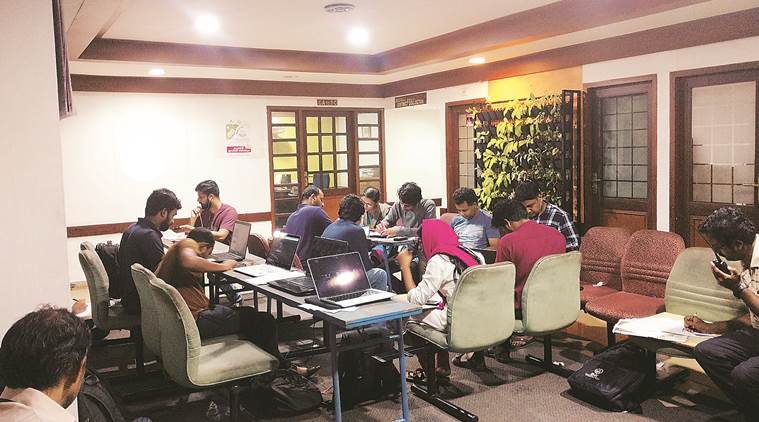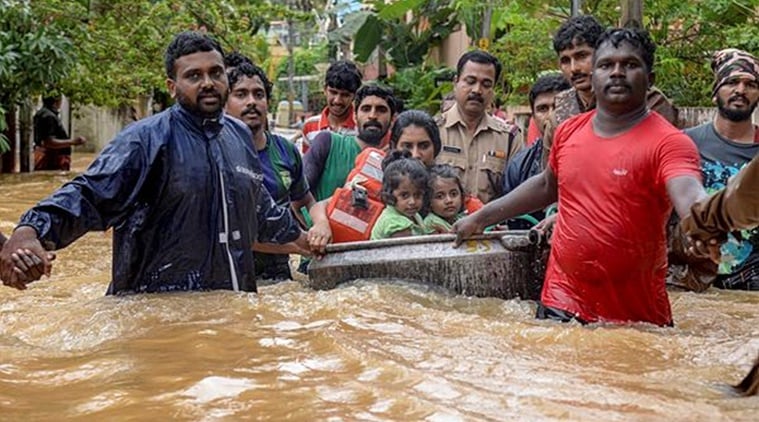 At the control room in Kakkanad, Kochi. (express photo by Vishnu Varma)
At the control room in Kakkanad, Kochi. (express photo by Vishnu Varma)
Inside two rooms on the first floor of the district collectorate in Kochi, nearly 40 men and women are busy handling phone calls and scribbling notes on pieces of paper. These are the faceless voices working the helpline numbers, handling distress calls in flood-ravaged Ernakulam district in central Kerala.
Most of them are from the state’s revenue department, police and various IT firms in Kakkanad, the city’s software hub. And their mandate is clear: Get the contact number, address and other details of all those who call, pass them on to colleagues operating desktops and laptops to be added to an excel sheet database. These sheets are then forwarded to local taluk offices, which relay them to central rescue and armed forces teams.
This control room, one of the key nodal helplines directing rescue operations in Kerala where heavy rains and floods have claimed 164 lives since August 8, is overseen by District Collector K Mohammed Y Safirulla — on Friday, he was based at the PWD Guest House in Pathadipalam, 5 km away.
 Around 79 boats belonging to the NDRF and over 400 fishermen boats were engaged in the rescue operation today in the flood-hit areas.
Around 79 boats belonging to the NDRF and over 400 fishermen boats were engaged in the rescue operation today in the flood-hit areas.
At the centre of the control room is Padmavathy, a revenue officer, who is scanning lists of stranded families in different parts of the district and forwarding them. The room is buzzing with phone calls every second. One of Padmavathy’s colleagues is jotting notes and shouting into the phone at the same time: “How many are struck? What? 500? Okay.” Then, she adds softly, “Don’t worry, we are passing on this message to authorities. In the meantime, please climb to higher floors if possible.”
A step-by-step guide on how you can donate to the CM’s relief fund
Padmavathy says, “Around 25 staff of the revenue department are here, the police and IT engineers make up the rest. Whatever information we get, we relay to the local taluk offices. We are not directly in touch with the military or central rescue teams.”
In the next room, Anil Kumar, an ACP in Kochi City Police, is monitoring a team of young IT engineers working on laptops and cell phones. It’s the same routine, with some moments of panic in between. As cell phone connectivity fluctuates — thousands of marooned households across Kerala are without power — the techies rush out into the corridor to prevent the call from dropping.
ACP Kumar also monitors and directs volunteers, and those who arrive to donate food and essential supplies. “The government has provided us with a lot of phone lines, but many people are still not able to connect with us. The incoming traffic is massive… We had never ever expected a tragedy of this scale. This is beyond our imagination,” he says. However, Kumar says, the sight of young men and women who have left their workplaces to volunteer at the control room is heartening. “There is social consciousness in all of them. That gives all of us hope,” he says, smiling.
Outside, V S Dileep Kumar, who heads an NGO for youth, is coordinating over the phone with students of polytechnic and medical colleges who are moving towards the collectorate from different corners of the city to work as volunteers. “We are ready for anything. We can receive or distribute food. We can offer medical assistance,” he says.
“I am sure you understand the limitations of the government machinery. There are limited phone lines and the messages they receive have to be picked up effectively by the rescue forces. So, we have to pitch in,” he says.
Among the IT volunteers is Anirudh and his two friends. On the side of the corridor, they have set up a table with three chairs, and are working on a laptop. The three friends, who had registered a domain to start a business, are now using it for flood rescue efforts. On the website, all those who are stranded can fill a contact sheet with details of their location, which will mark them on a map. Anirudh and his two friends then use the details to call them, if possible, or forward the location to district authorities. “The helpline numbers are likely to be jammed because a lot of people are calling. So we have set up a parallel system through which we can record pleas for help and forward it to the government,” says Anirudh.
Asked about his own family, he says, “My mother, father and grandmother are at home in Kozhikode. The water has reached the last step of the front porch. If it rises by one more metre, it will enter the house. There is no power supply, either. Even when I am helping others, there is always a fear in my heart about my own family.”